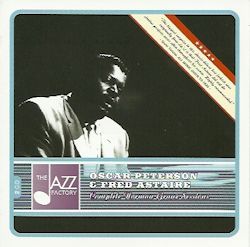CD 1
1. Isn't This a Lovely Day
2. Puttin' on the Ritz
3. I Used to Be Colour Blind
4. The Continental
5. Let's Call the Whole Thing Off
6. Change Partners
7. 'S Wonderful
8. Lovely to Look At
9. They All Laughed
10. Cheek to Cheek
11. Steppin' Out with My Baby
12. The Way You Look Tonight
13. I've Got My Eyes on You
14. Dancing in the Dark
15. The Carioca
16. Nice Work If You Can Get It
17. New Sun in the Sky
18. I Won't Dance
19. Fast Dances
20. Top Hat, White Tie and Tails
21. No Strings
22. I Concentrate on You
23. I'm Putting All My Eggs in One Basket
CD 2
1. A Fine Romance
2. Night and Day
3. Fascinating Rhythm
4. I Love Louisa
5. Slow Dances
6. Medium Dance
7. They Can't Take That Away from Me
8. You're Easy to Dance With
9. A Needle in a Haystack
10. So Near and Yet So Far Away
11. A Foggy Day
12. Oh, Lady Be Good
13. I'm Building Up to an Awful Letdown
14. Not My Girl
15. Jam Session for a Dancer
16. The Astaire Blues
17. The Second Astaire Blues
Fred Astaire
- Vocals, tap dance (tracks I/1-23, II/1-14)
Oscar Peterson – Piano, celeste
Charlie Shavers
– Trumpet
Flip Phillips
- Tenor sax
Barney Kessel
- Guitar
Ray Brown
- Bass
Alvin Stoller
– Drums
Only an astute entrepreneur like Norman Granz would have the idea of taking Fred Astaire into a studio with a small group of jazz musicians to record
enough tracks to fill four LPs. The sessions took place in 1952, and the songs were mostly ones that Fred had performed in his numerous films and stage
appearances. These songs mostly come from the Great American Songbook, composed by such experts as Irving Berlin, Jerome Kern, Cole Porter and the Gershwin
brothers.
So the material is of guaranteed quality and Astaire conveys each song with attention to the lyrics and phrasing which matches the freedom of his jazz
accompanists. Fred had shown his rhythmic sense in his peerless dancing in so many films and he enjoyed playing the drums as well as the piano. His
experience and sensitivity make him one of the best interpreters of the American Songbook. His pleasantly distinctive voice is never loud but it has an
inner swing and a care to transmit faithfully the witty lyrics of such urbane writers as Lorenz Hart and Ira Gershwin.
For this session, Norman Granz chose his favourite pianist – Oscar Peterson, who is ideal for accompanying Astaire. The supporting sextet provides
admirable backing, with Charlie Shavers’ virtuosic trumpet and Flip Phillips’ warm tenor sax joined by a superb rhythm section. Alvin Stoller adds several
well-judged drum breaks to such numbers as Puttin’ on the Ritz. A Fine Romance has a delicate guitar solo from Barney Kessel and a gently swinging
solo from Oscar Peterson, as well as subtle saxophone behind Astaire’s vocals. The vocalist displays his expertise with lyrics, changing from singing to
speaking halfway through “You never give the orchids I send a glance, No – you like cactus plants”. This album reinforces my view that vocalists are often
best when backed by a small group rather than a large orchestra.
Astaire gives spoken introductions to some of the songs, including Night and Day, which he says is a song from the only stage show of his which
was turned into a film (The Gay Divorce became The Gay Divorcee). It has delicate trumpet from Charlie Shavers behind the vocals, as does They Can’t Take That Away from Me. Astaire’s dancing abilities are not forgotten, as he does some percussive “hoofing” on several tracks, showing
that he certainly had a sense of rhythm.
As well as familiar items from the American songbook, there are some rarities, such as Irving Berlin’s You’re Easy to Dance With (from the 1942
film Holiday Inn) and Cole Porter’s So Near and So Far Away (from the 1941 film You’ll Never Get Rich). Astaire reveals
that he co-wrote two of the songs: the fairly well-known I’m Building Up to an Awful Letdown and the almost-unknown Not My Girl. Fred plays piano on the first chorus of Not My Girl. And he steps out of the last three tracks on the second CD, leaving
Oscar Peterson and his group to jam cheerfully.
So is this a jazz CD? Fred Astaire says “This album is a kind of jazz album” and the presence of six fine jazz musicians suggests it must be. And although
Fred is not a jazz vocalist as such, his uninhibited phrasing and relaxed delivery are qualities that any jazz singer would like to have. However you
categorise it, this is a marvellous album – nearly 156 minutes of sophisticated but unassuming brilliance.
Tony Augarde
www.augardebooks.co.uk
